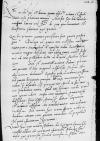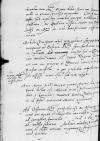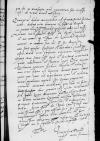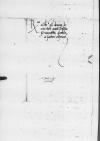Mirifice sum delectatus humaniss written over ...⌈... illegible⌈...... illegible⌉ssss written over ...⌉imis ⌊⌋ Vestrae Reverendissimae Dominationis, pro qua humanitate et beneficentia plurimas ago gratias.
Quae ⌊hic⌋ gerantur, quoniam paucissima sunt, paucis perstringam. ⌊Princeps noster⌋ gratia Deo rectissime valet written over at⌈attt written over at⌉ exceptus a senato stain⌈[o]o stain⌉ribus et equestri ordine huius ⌊Poloniae Minoris⌋ magno desiderio, non absque tamen omnium suspiciis ab imis pectoribus ductis ob id, quod factum est etc.
Sed et senatores ⌊Maioris Poloniae⌋ per nuntios privatos et litteras magnum affectum, studium et observantiam declarant. Equester ordo, ut audimus, mussitat, sed partim benignitate principis, partim superinscribed in place of crossed-out et⌈et partim partim superinscribed in place of crossed-out et⌉ metu imminentium periculorum, si discordes esse perrexerint, facile in his ⌊comitiis⌋ sedabuntur omnia. Quod nos sperare multi rerum non ignari iubent. Neque vero tantopere primores hi dissident, sicut istic fortasse dicitur. Loquuntur et iocantur affatim. De occultis autem non iudicat ecclesia, sed ⌊comitia⌋ haec rerum faciem nobis indicabunt, utinam vero gratam, iucundam et perpetuam. Id quod futurum speramus.
Venit ⌊huc⌋ ex ⌊Maiore Polonia⌋ dominus ⌊Georgius Konarski⌋ equestris ordinis ille veteranus choraules ⌊filiumque⌋ suum nuper ex gymnasio Italico reversum in fidem et  BCz, 1599, p. 1108 clientelam sacrae ⌊maiestatis regiae⌋ dedit. Hunc iam sequuntur ms. sequenter(!)
⌈sequuntursequuntur ms. sequenter(!)
⌉ multi, ut gratiam ⌊principis⌋ aucupentur, et princeps iusti ius neglectum omnibus ex aequo redditurum se pollicetur. Sic feliciter cessura omnia non diffido hidden by binding⌈[ido]ido hidden by binding⌉ atque ita Reverendissima Dominatio Vestra bono sit animo, vehementer oro.
BCz, 1599, p. 1108 clientelam sacrae ⌊maiestatis regiae⌋ dedit. Hunc iam sequuntur ms. sequenter(!)
⌈sequuntursequuntur ms. sequenter(!)
⌉ multi, ut gratiam ⌊principis⌋ aucupentur, et princeps iusti ius neglectum omnibus ex aequo redditurum se pollicetur. Sic feliciter cessura omnia non diffido hidden by binding⌈[ido]ido hidden by binding⌉ atque ita Reverendissima Dominatio Vestra bono sit animo, vehementer oro.
De bello Pruthenico nihil certi audimus. Faxit Deus Omnipotens, ut ⌊caesarea maiestas⌋ hac felicitate non in Christiano written over i⌈ioo written over i⌉s sed iam aus amplius, sed in ⌊Thurcos hidden by binding⌈[os]os hidden by binding⌉⌋ iam tandem utatur et ⌊Regno Ungariae⌋ succurrat iamiam perituro, si ⌊Thurcus⌋ advenerit bello hidden by binding⌈[llo]llo hidden by binding⌉ Persico confecto, in quo praeludia infeliciter sibi cessisse rumor est, nempe cesse caesa esse 70 milia hominum on the margin⌈nempe cesse caesa esse 70 milia hominumnempe cesse caesa esse 70 milia hominum on the margin⌉, sed certi nihil.
Dies funeri serenissimi ⌊regis⌋ patris patriae 1548-07-26⌊Divae Annae hidden by binding⌈[ae]ae hidden by binding⌉1548-07-26⌋ sacer dictus est, ⌊comitiis⌋ vero Petrcoviensibus 1548-08-10⌊dies Sancti Laurentii1548-08-10⌋. ⌊Maiores tamen Poloni⌋ petunt hidden by binding⌈[t]t hidden by binding⌉, ut ad 1548-09-08⌊festum Nativitatis Mariae1548-09-08⌋ reiciantur.
Ad ⌊caesaream maiestatem⌋ profectus est dominus ⌊Ostrorog⌋ iuvenis acri ingenio et eloquentia non vulgari petitum hidden by binding⌈[m]m hidden by binding⌉ ad exsequias funerales, ad serenissimum ⌊Romanorum regem hidden by binding⌈[em]em hidden by binding⌉⌋ dominus doctor ⌊Cromerus⌋. Audimus nonnullos principes ⌊Ger hidden by binding⌈[Ger]Ger hidden by binding⌉maniae⌋ et ⌊Slesiae⌋ venturos magnamque frequentiam ho hidden by binding⌈[ho]ho hidden by binding⌉minum futuram.  BCz, 1599, p. 1109 Quo fit, ut marsupia nostra exenterata sint. Necesse est ob rerum omnium caristiam.
BCz, 1599, p. 1109 Quo fit, ut marsupia nostra exenterata sint. Necesse est ob rerum omnium caristiam.
⌊Princeps⌋ noster diebus communibus ad funus ⌊patris⌋ sacra audit, diebus vero dominicis et festis in templo ac primis etiam et secundis vesperas solet interesse. Verum male habet reverendissimum dominum ⌊episcopum Cracoviensem⌋ et nos omnes, quod reverendissimus dominus ⌊Leonardus episcopus Camenecensis⌋ in contione sua 1548-06-24⌊die Sancti Ioannis Baptistae1548-06-24⌋ non satis apposite episcopos et sacerdotes primum Pharisaeis, deinde vero progeniei viperarum comparavit. Dixit item satius esse episcopos et sacerdotes uxoratos quam adulterari et scortari etc. Ecce, inquit, ⌊Zacharias⌋ uxorem habuit. Multa et alia parum certe digna est locutus. ⌊Bonus pater⌋ citius, quam par erat, ad sepulturam venit et videtur auram popularem captare spe episcopatus pinguioris potiundi, immemor continentiae, quae Deo in sacerdotis sacrificiodote gratior est, quam matrimonium.
Sed 1548-06-29⌊hodie1548-06-29⌋ ⌊Lucas⌋ contionator doctus et prudens ac divina memoria ⌊Leonardi⌋ missam celebrantis perargute sententiam excussit et redarguit severe. Spero reverendissimum dominum ⌊episcopum Cracoviensem⌋ (nisi ita mitissimus esset) pro officio suo haec omnia temperaturum.
Plura non vacat et haec raptissime scripta vix relegere non licuit.
 BCz, 1599, p. 1108 clientelam sacrae
BCz, 1599, p. 1108 clientelam sacrae  BCz, 1599, p. 1109 Quo fit, ut marsupia nostra exenterata sint. Necesse est ob rerum omnium caristiam.
BCz, 1599, p. 1109 Quo fit, ut marsupia nostra exenterata sint. Necesse est ob rerum omnium caristiam.


